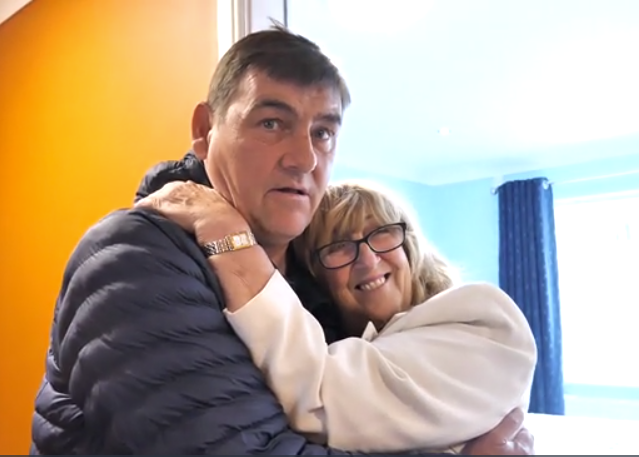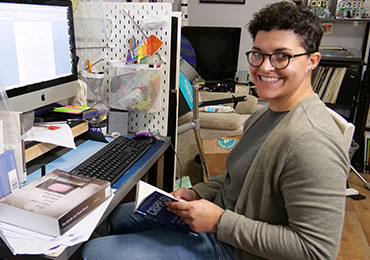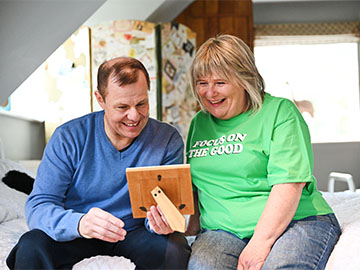Ollie’s second chance at life!
The sweet sound of a cello being tenderly played echoes through the halls of John Cabot House, our specialist brain injury rehabilitation service in Bristol.
Behind this sweet music melody is Ollie, a person we support. A smile beams from ear to ear, and her eyes twinkle brightly, lighting up her room as she plays. Ollie moved to John Cabot House just over a year ago, after she suffered a hypoxic brain injury. For years before that, she struggled with severe mental health issues and spent her days wondering if she deserved a happy future.
When Ollie finally reached a point where she felt happy with life, a fateful fall unravelled her future. Ollie’s symptoms cast a heavy shadow over her life – and she questioned whether she could go on living.
Reaching breaking point, a tragic incident turned into a window of hope for Ollie. With expert support from our team at John Cabot House, Ollie has a second chance at life and is now preparing to make a move she never thought she’d live to see.
A tough start
Throughout childhood, Ollie was met with challenges. Bullied at school, she lost her confidence and increasingly isolated herself. She struggled with her identity and coped by shutting out the rest of the world.
When she was a teenager, her homelife became unstable when her parent’s relationship broke down. As a result, her relationships with them suffered too. Ollie felt like she had no one to talk to and tried to navigate these difficulties alone.
Burying her emotions, Ollie’s life felt like it was spinning out of control. Secretly self-harming, her mental health was suffering. She was eventually diagnosed with several mental health conditions, including an eating disorder, and admitted to an adolescent psychiatric unit.
Twelve months later, Ollie returned home with a renewed outlook, and she was ready to get on with her life! Transitioning from high school to sixth form, she felt like her future had hope.
Throughout college and university, Ollie enjoyed typical student life! Filled with fun, friends, and laughter, she was finally in a good place. But during her final year of university, exam pressure affected Ollie and her mental health began to suffer again.
A visit to the doctors saw her prescribed antidepressants, but she experienced negative side-effects. Unable to concentrate and watching her world spiral around her, Ollie’s studies were impacted, and she didn’t pass her final exams. But, determined to finish university, she bravely rallied herself to re-sit her exams – and this time, she passed!
Ollie graduated university and pursued an exciting opportunity to become an Outdoor Instructor. A lover of the great outdoors, this was the ideal start to her career! Working with disadvantaged children, she would be changing lives through her passion for exploring nature. Ollie excitedly moved away from home to start her new role and lay the foundations for a bright future.
Facing tragedy
At the beginning of this new chapter in her life, Ollie’s mental health greatly improved. Finding herself in a stable relationship, she had a good group of friends and was enjoying life!
Unknown to Ollie, this would be short lived as tragedy was just around the corner. Ollie suffered an unexpected loss when one of the young people she was mentoring suddenly passed away. She was deeply affected by this loss and old feelings soon began to bubble to the surface. Ollie struggled with anxiety and started self-harming again. Noticing that her mental health was suffering, she took responsibility for her health and paid to see a private Psychiatrist.
In her first session, she was diagnosed with borderline personality disorder (BPD), and prescribed medication that hadn’t worked well for her in the past. Ollie was disheartened with this diagnosis. Reluctantly, she took the medication and hoped she’d start to feel better. But she didn’t. She made the decision to stop taking the medication and seek help elsewhere. Ollie started seeing a psychologist, who helped her with her troubles.
Life was getting back on track for Ollie until, one day when out rock climbing, she fell down the side of a mountain. Falling on her head, Ollie was injured.
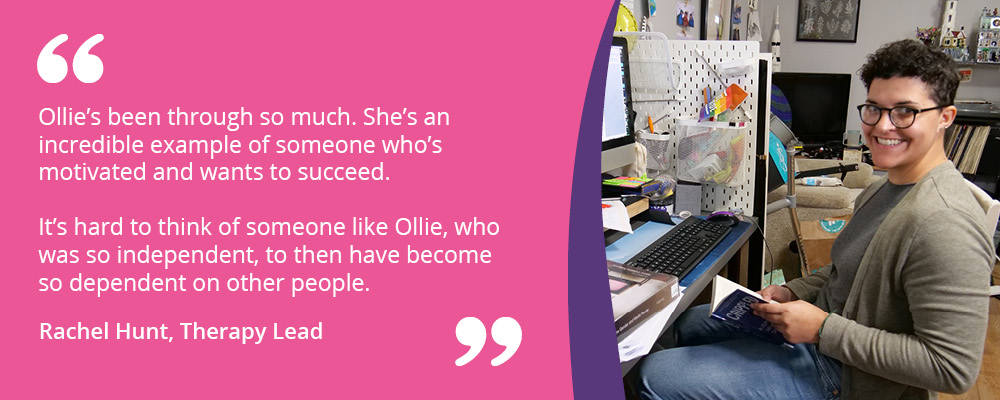
An unexpected turn
A week after her fall, she started to experience some unusual symptoms. Ollie started hearing voices in her head. Desperately trying to ignore them, Ollie couldn’t silence the noise. Attempting to tackle the voices in her head, she began hurting herself again, and found herself in a vicious cycle, regularly visiting A&E to repair the damage she’d done.
Eventually, she was sectioned on a psychiatric ward. When in hospital, Ollie felt safe from herself. But her misdiagnosis of borderline personality disorder determined how she was treated until eventually, she stopped being sectioned.
At this time, Ollie was living with her partner and their parents. Ollie had to move out and was put up in emergency housing in an environment that was destructive to Ollie’s current state of mind. Alone and afraid, she came under attack from the voices in her head again.
Breaking point
Suffering with her mental health, Ollie questioned whether she could go on living if this was what life was going to be like. As the voices got louder, they encouraged her to do things she didn’t want to do.
Ollie couldn’t cope. She decided to stop the voices and attempted to take her own life, suffering a puncture to the bowel in the process. Ollie was taken to hospital, where she would stay for several months.
As soon as Ollie was discharged from hospital, the voices started again. She felt like nothing was working. She’d tried everything but couldn’t escape what was going on in her head.
“It felt like a record was going around in my head on repeat. Telling me to do things to myself that I didn’t want to do. There was no escape.”
Ollie, a person we support at John Cabot House
In just a few short months, Ollie was back where she started. She gave into the destructive voices that haunted her and gave herself another puncture to her bowel.
This time, things were different. While Ollie was in hospital, she was under supervision, and someone checked on her every 15 minutes. But the voices were still there, louder than ever.
One day, when Ollie was unsupervised, she nervously went to the bathroom – intending to never come back out. When someone came to check on her, there was no response. Breaking down the bathroom door, Ollie had hung herself.
Silencing the noise
The next few months were a blur for Ollie. She suffered hypoxia as a result of her attempted suicide, and her brain was starved of oxygen. Although Ollie was found just in time, her life had changed.
Her brain injury meant she had physical changes to navigate. Her speech, mobility, and memory were impaired, and she would need specialist support to rehabilitate and regain much deserved control over her life.
Ollie also had some mental health changes to navigate when she noticed the voices in her head had gone. Still struggling with her mental health, the hospital discharged Ollie to a specialist mental health home. But the team there didn’t understand the complications of her brain injury. Ollie struggled to navigate her new world and her mood plummeted. Feeling like no one was listening to her needs, she lost faith in others and began isolating herself again.
Ollie’s future became a muddy vision, so she reached out to her mum for help.
Back to Bristol
Ollie’s previous placement was away from her hometown of Bristol. So, when Ollie reached out to her mum and expressed her concerns about where she lived, mum wasted no time ensuring Ollie could move closer to home.
Setting the wheels in fast motion, Ollie and her mum were introduced to Voyage Care. As if by chance, a room became available at John Cabot House in Bristol. Unsatisfied with Ollie couped up in her bedroom, her mum visited the team at John Cabot House.
Her eyes lit up when she saw how happy and engaged everyone was. Instantly, she knew this was exactly where her daughter needed to be. At John Cabot House, Ollie would have the opportunity to rehabilitate from her brain injury and get the second chance at life she deserved.
Ollie made her move to John Cabot House just two days before Christmas. It was the best present she and her family could have asked for. Before her team could even help her unpack, she headed home to spend the holidays with her family. Two weeks later, returning to her self-contained flat at John Cabot House, Ollie was ready to start her rehabilitation journey.
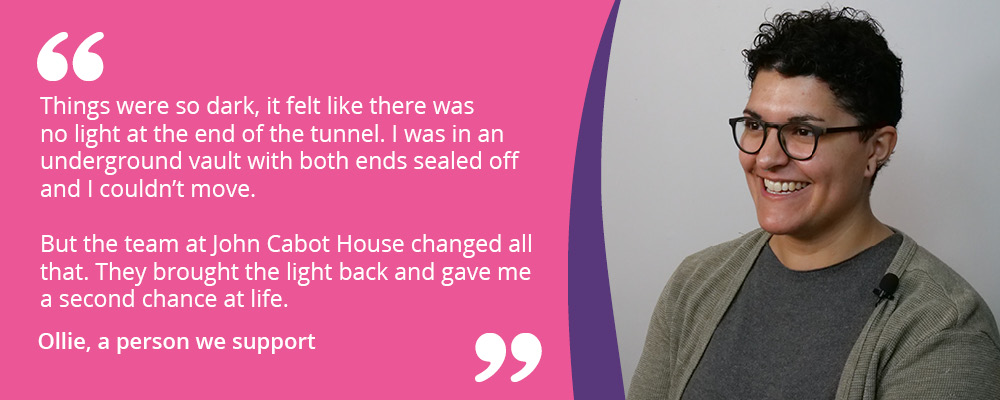
Positive steps
Moving was emotional for Ollie. She hadn’t processed her brain injury and she felt like a different person. But it didn’t take long for our team at John Cabot House to warmly welcome Ollie into the fold.
Taking her under their wing, Ollie was relieved at the compassion of her new team. Empowered to be open and honest about her feelings, they supported Ollie through her low moments.
For many years, Ollie felt like she was out of control of her life. She felt as though she’s been a passenger in her mind, with another force in the driver’s seat. With the support of her team, Ollie was back where she belonged – both hands on the steering wheel, with the future hers to create.
Getting to know Ollie as an individual was key to helping her regaining control of her life. Her team recognised she was proactive but could be introverted at times. Isolated in hospital and her previous placement, Ollie had got used to being alone. Respecting this, they gently encouraged Ollie to come out of her room to socialise with her housemates and engage with activities, but still take time to herself.
Her team knew that this would be a hard habit to break and didn’t want to make Ollie uncomfortable. But they also knew building meaningful relationships with others would benefit her emotional wellbeing and her rehabilitation goals. Ollie wanted to regain her mobility and, to do this, she needed to trust those around her.
Building a future
When she arrived at John Cabot House, Ollie had already accepted life in a wheelchair. It became part of her identity. Ollie’s support team identified she was lacking self-esteem and belief. But they saw how motivated and passionate she was in daily life and they believed they could help her walk again. As Ollie began to trust her team, she started to believe this too.
Dedicated and driven to regain her mobility, Ollie worked closely with her Therapy Lead at John Cabot House to make positive steps and achieve this goal. With extra expert support from a physiotherapist and psychologist, Ollie felt herself becoming stronger every day.
With a fearless attitude and unwavering support from her team, she made big strides in her progress. In the past, her relationships had been unstable, leaving her insecure and lacking self-worth. Simply building relationships and knowing she had people she could talk to made a massive difference to Ollie.
Living at John Cabot House fuelled her with self-belief. Everyone cheered her on and committed time to supporting her in fulfilling her goals. Ollie was empowered with the emotional strength to tackle this challenge. And, with their expert training, our team at John Cabot House understood how both Ollie’s brain injury and her mental health might be affecting her mobility.
With support, Ollie quickly transitioned from her wheelchair to using a walking frame. And she didn’t stop there. With her newfound confidence, she set a new goal – to walk with crutches. Teaming up with her Therapy Lead, they set to work on reaching this stage in Ollie’s rehabilitation. But Ollie was determined and, two days later, she was walking with crutches!
A second chance
Since finding her feet at John Cabot House, there’s been no stopping Ollie! Regaining more mobility and managing her mental health, she’s on track to tick off even bigger goals.
Our team at John Cabot House gave Ollie back her self-belief. So much so, she enrolled on a master’s degree at Bristol University and will graduate in 2025! Going back to university has also helped Ollie develop faith in others. She’s found a firm group of friends – something she didn’t think would be possible before she joined John Cabot House.
A passionate musician, her team supported her to rekindle an old flame. As part of her therapy plan, Ollie’s relearnt to play the piano and has recently taken up the cello.
But that’s not all. Ollie’s progress has been quick. All she needed was people she could trust and some person-centred care, which is what her team at John Cabot House gave her. Along with deep understanding of her brain injury and the support she needed to rehabilitate and heal from her trauma, Ollie’s future has transformed from a muddy vision to a bright, clear picture. And for Ollie, that future involves moving into her own flat – she’s now ready for discharge!
“We’re now planning discharge for Ollie. She’s been so motivated and determined. She’s a really inspiring person. Every time she sets a goal, she’s determined to achieve it – and she has! The Ollie we have today is not the Ollie that arrived at John Cabot House.
We’ve had low moments, but she’s completely transformed. She’s now confident enough to live completely independently. We’ll arrange a transition period, which will involve check-in calls. But, overall, there’s nothing else we can give Ollie at John Cabot House. It’s been an honour to get to know Ollie and be part of her journey. Her story is so inspiring – she’s a living miracle.”
Rachel Hunt, Therapy Lead at John Cabot House
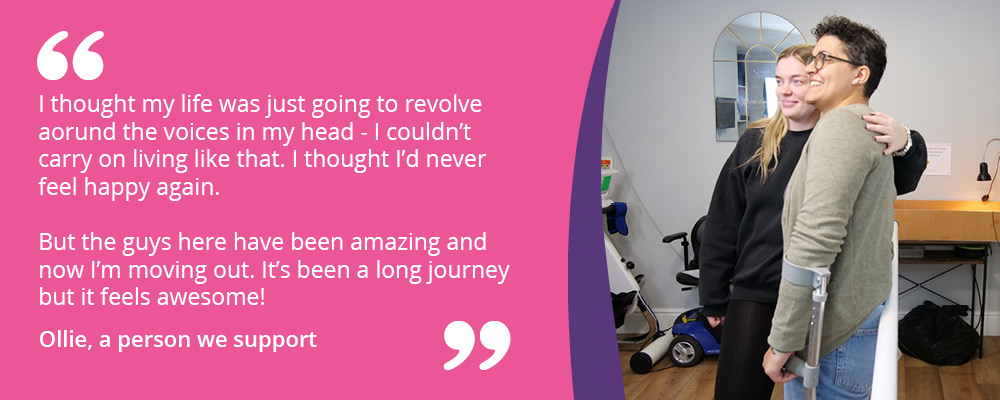
Find out more about our specialist brain injury rehabilitation support
To find out more about our specialist brain injury support and how we can help you, a loved one, or a client, fill out our simple enquiry form and a member of our team will be in touch.

 Brain injury rehab
Brain injury rehab  More success stories
More success stories 